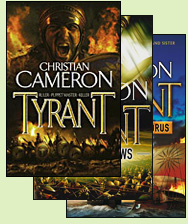The "Tyrant" Series
by Christian Cameron
Reviewed by David Maclaine

The worst thing I can think of to say about the "Tyrant" series is I'm not crazy about the title. It refers to the metaphor coined by a character who calls war the greatest tyrant of all. Though clever, it gives no particular idea what the whole series is about. The first three novels center on the interaction of the Greeks with the Sahks - Herodotus called them Scyths - the magnificent horse people who dominated the steppes north of the Black Sea that they called the "Sea of Grass." These are novels of action and warfare, so full of characters I sometimes regretted the lack of a cast list of the kind included in Cameron's Killer of Men books; I couldn't always mourn properly over the frequent deaths, because I wasn't always sure who had just died. But the main characters are engaging, their stories gripping, and the setting richly drawn.
The first novel, Tyrant, begins with an Athenian mercenary named Kineas taking a job for the archon of a city on the north shore of the Black Sea. Before it's over he forms an alliance with the Sahks, finds the love of his life in one of their proud Amazonian women, and defeats a Macedonian invasion. In the second book, Storm of Arrows, he and his circle of friends embark on a great trek to the far end of the Sea of Grass to wage war against Alexander the Great. The third novel, Funeral Games, begins more than twelve years later when his twin children must survive the murder of their mother and then fight their way across much of the Greek world to the court of King Ptolemy. In the fourth, King of the Bosporus, the twins make their way north again to fight for their parents' kingdom. It's a long trip worth taking because Cameron has the knowledge and skill to make an obscure corner of the ancient world feel vibrant and very much alive.
#1: Tyrant. See review or more info at Powell's Books
#2: Storm of Arrows. See review or more info at Powell's Books
#3: Funeral Games. See review or more info at Powell's Books
#4: King of the Bosporus. See review or more info at Powell's Books
#5: Destroyer of Cities. See review or more info at Powell's Books
Back to Novels of Ancient History
Back to Directory of Book Reviews